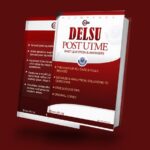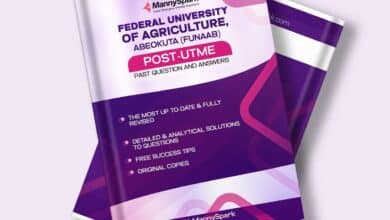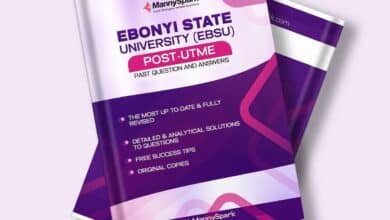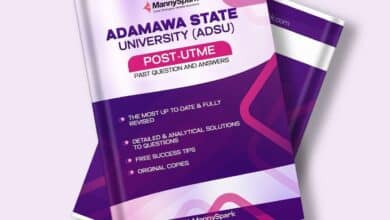
Updated UNIBEN Post-UTME Past Questions and Answers

You’ve finished writing your UTME and you’re thinking what’s next, well, the next step is to write Post UTME. Now you’re thinking of which higher institution to pick or a university to pick and what pops up in your mind is the prestigious University of Benin (UNIBEN) and you’re so scared because you’ve heard a lot of people saying that passing the school Post UTME is very hard and difficult, I’m telling you, it’s not hard to pass their Post UTME or get above the aggregate score. That’s why we are creating a guide for you, so that you’ll be able to ace the exam feeling confident and bold.
ABOUT UNIVERSITY OF BENIN (UNIBEN)
The University of Benin is a public research university situated in Benin City, Edo State, Nigeria. It was founded in 1970 and is one of the universities owned by the Federal Government of Nigeria. It currently has two campuses, in Ugbowo and Ekehuan, respectively, with fifteen faculties and a central library known as the John Harris Library.
The buildings at UNIBEN are sparsely built and distant from one another. Originally founded as an Institute of Technology, the university was officially recognized as a full-fledged university on July 1, 1971, and accredited by the National Universities Commission (NUC) on April 1, 1975.

FACULTIES IN UNIBEN
The following are the faculties in Uniben:
- Arts
- Agriculture
- Basic Medical Sciences
- Dentistry
- Education
- Engineering
- Environmental Sciences
- Law
- Life Science
- Management Science
- Pharmacy
- Physical Science
- Social Science
- School of Medical Sciences
- College of Medicine
- Veterinary Medicine
WHY IS PAST QUESTIONS IMPORTANT?
Past questions are very important because it helps in:
Understanding exam structure:
By reviewing past papers, students can familiarize themselves with the exam layout, question types, and the number of questions in each section, which helps manage time during the actual exam.
Identifying key concepts:
Past questions often highlight the most important topics and concepts that are likely to be tested, allowing students to focus their studying on those areas.
Practice with question wording:
Past questions can reveal the specific language and phrasing used in exam questions, which can help students interpret questions accurately and formulate well-structured answers.
Time management practice:
Practicing with past papers allows students to gauge how long it takes to answer each question and develop effective time management strategies during the exam.
Confidence building:
Successfully answering past questions can boost a student’s confidence and preparedness for the actual exam.
Identifying areas for improvement:
By reviewing their answers to past questions, students can identify areas where they need additional study or practice.
📚How to Get the Updated PDF Past Questions
To get the full past questions and answers, follow these steps:
Make a payment of ₦3,000
Send proof of payment via WhatsApp Receive the PDF file instantly
Payment Method:
- Bank Transfer (Account details available upon request)
- Mobile Payment (Via bank apps or USSD)
💻 Quick Purchase Link
CLICK HERE TO BUY UNIBEN Post UTME Questions and Answers
“Success in your exam starts with the right preparation. Don’t miss this opportunity!”
UNIBEN POST UTME PAST QUESTIONS FORMAT
The UNIBEN Post UTME is a Computer Based Test (CBT) exam and it has multiple choice questions that covers all the subjects you’re doing depending on the course you choose.
For example:
- English and literature: You’ll need subjects like English, Literature, Government and any other subject
- Medicine: Maths, Biology, Chemistry and any other subject
- Engineering: Maths, Physics, Chemistry and Further Maths
ELIGIBILITY REQUIREMENTS FOR UNIBEN POST UTME EXAM
To be eligible for the post-UTME screening at the University of Benin (UNIBEN), you must meet certain requirements, including a minimum JAMB score and O-level credit passes.
JAMB SCORE
You must score at least 200 in the JAMB to be eligible to purchase the post-UTME form.
For more competitive courses, like medicine, law, and pharmacy, you should aim for a score of 250–300.
O-level credit passes
You must have at least five O-level credit passes in WASC, SSCE/GCE, NECO, or their equivalent.
The subjects must include English Language, Mathematics, and Economics.
You must have obtained these passes in no more than two sittings.
Screening subjects
The screening subjects include English Language, Mathematics, and three other relevant subjects.If you don’t need a credit in Mathematics, you can include four relevant subjects.
Screening method
- The screening exercise is conducted using a Computer Based Test (CBT).
- You should be seated at least one hour before the scheduled time for your screening exercise.
UNIBEN POST UTME PAST QUESTIONS STRUCTURES
The University of Benin (UNIBEN) Post-UTME past questions typically follow a specific structure. Here’s a general overview:
Sections and Format
1. Multiple Choice Questions (MCQs): 100-150 questions, divided into:
1. English Language: 20-30 questions, testing grammar, vocabulary, comprehension, and literature.
2. Mathematics: 20-30 questions, covering algebra, geometry, trigonometry, and calculus.
3. General Knowledge: 10-20 questions, assessing knowledge of current events, history, science, and technology.
4. Subject-Specific Questions: 30-50 questions, depending on the candidate’s chosen course of study.
Question Types
1. Objective Questions: Multiple-choice questions with four options (A, B, C, D).
2. Fill-in-the-Gap Questions: Candidates fill in the missing word or phrase.
Time Allocation
1. Total Time: 1HOUR
2. Time per Question: Approximately 1-2 minutes per question
FREQUENTLY ASKED QUESTIONS

Here are some questions that have been asked by students like you:
WHAT IS THE AGGREGATE SCORE FOR UNIBEN POST UTME?
The aggregate score for Uniben Post UTME differs on the course you want to study. For instance, there are some courses that the aggregate score is 50.
While for some courses like medicine and other science courses, will have an aggregate score of 70 and above.
IS UNIBEN POST UTME HARD?
Uniben Post UTME is hard but if you don’t prepare well it will be very hard for you. The difficulty level of the University of Benin (UNIBEN) Post-UTME exam can vary depending on several factors, such as:
Factors Influencing Difficulty
1. Individual preparation: How well-prepared you are for the exam can greatly impact your perception of its difficulty.
2. Course of study: The Post-UTME exam questions may be more challenging for certain courses, such as engineering, medicine, or law.
3. Competition: UNIBEN is a popular institution, and the Post-UTME exam can be competitive, which may make it seem more challenging
CAN I CHANGE MY COURSE AREA AFTER WRITING POST UTME?
In the University of Benin (UNIBEN), the possibility of changing one’s course area after writing the Post-UTME exam depends on certain conditions and guidelines. Here’s what you need to know:
Eligibility for Course Change
1. Cut-off mark: You must meet the cut-off mark for the new course you wish to change to.
2. Admission quota: The new course must have available spaces within its admission quota.
3. O’Level requirements: You must meet the O’Level requirements for the new course.
Procedure for Course Change
1. Check eligibility: Verify that you meet the eligibility criteria for the new course.
2. Submit application: Fill out a change of course form, usually available at the university’s admissions office or online portal.
3.Pay change of course fee: Pay the required fee for changing courses, as stipulated by the university.
4. Wait for approval: The university will review your application and notify you of the outcome
WHAT ARE THE SUBJECTS EACH COURSE AREA NEED FOR UNIBEN POST UTME?
Here are the subjects required for various course areas in the University of Benin (UNIBEN) Post-UTME exam:Arts and Humanities
1. English and Literary Studies: English Language, Literature-in-English
2. History: History, English Language
3. Linguistics and African Languages: English Language, Linguistics
4. Philosophy: English Language, Philosophy
5. Religious Studies: English Language, Religious Studies
6. Theatre Arts: English Language, Theatre Arts
Social Sciences
- Banking and Finance: English Language, Mathematics, Economics
- Business Administration: English Language, Mathematics, Economics
- Economics: English Language, Mathematics, Economics
- Geography and Regional Planning: English Language, Geography
- Political Science: English Language, Government
- Psychology: English Language, Mathematics, Biology
- Sociology: English Language, Mathematics, Sociology
Education
1. Adult Education: English Language, Mathematics
2. Education Accounting: English Language, Mathematics, Economics
3. Education Biology: English Language, Biology
4. Education Chemistry: English Language, Chemistry
5. Education English: English Language, Literature-in-English
6. Education Geography: English Language, Geography
7. Education Mathematics: English Language, Mathematics
8. Education Physics: English Language, Physics
Engineering
1. Agricultural and Bioresources Engineering: English Language, Mathematics, Physics
2. Chemical Engineering: English Language, Mathematics, Physics
3. Civil Engineering: English Language, Mathematics, Physics
4. Computer Engineering: English Language, Mathematics, Physics
5. Electrical/Environmental Sciences Electronics Engineering: English Language, Mathematics, Physics
6. Mechanical Engineering: English Language, Mathematics, Physics
7. Petroleum Engineering: English Language, Mathematics, Physics
Life Sciences
1. Biochemistry: English Language, Biology, Chemistry
2. Botany: English Language, Biology
3. Microbiology: English Language, Biology, Chemistry
4. Zoology: English Language, Biology
Management Sciences
1. Actuarial Science: English Language, Mathematics, Economics
2. Business Administration: English Language, Mathematics, Economics
3. Industrial Relations and Personnel Management: English Language, Mathematics, Economics
4. Marketing: English Language, Mathematics, Economics
Medical Sciences
1. Anatomy: English Language, Biology
2. Biochemistry: English Language, Biology, Chemistry
3.Medicine and Surgery: English Language, Biology, Chemistry, Physics
4. *Nursing*: English Language, Biology
5. *Pharmacology*: English Language, Biology, Chemistry
6. *Physiology*: English Language, Biology
Physical Sciences
1. Chemistry: English Language, Chemistry
2. Computer Science: English Language, Mathematics, Physics
3. Geology: English Language, Geography
4. Mathematics: English Language, Mathematics
5. Physics: English Language, Physics
📚How to Get the Updated PDF Past Questions🎯
To get the full past questions and answers, follow these steps:
Make a payment of ₦2,000
Send proof of payment via WhatsApp Receive the PDF file instantly
Payment Method:
- Bank Transfer (Account details available upon request)
- Mobile Payment (Via bank apps or USSD)
💻 Quick Purchase Link
CLICK HERE TO BUY UNIBEN Post UTME Questions and Answers
“Success in your exam starts with the right preparation. Don’t miss this opportunity!”










